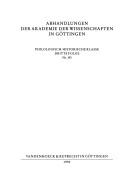| Listing 1 - 5 of 5 |
Sort by
|
Book
Year: 1911 Publisher: Göteborg : Zachrissons boktryckeri,
Abstract | Keywords | Export | Availability | Bookmark
 Loading...
Loading...Choose an application
- Reference Manager
- EndNote
- RefWorks (Direct export to RefWorks)
Book
ISBN: 9282884813 9789282884812 Year: 2000 Publisher: Luxembourg : Office des publications officielles des communautés européennes = Office for official publications of the European communities = OPOCE,
Abstract | Keywords | Export | Availability | Bookmark
 Loading...
Loading...Choose an application
- Reference Manager
- EndNote
- RefWorks (Direct export to RefWorks)
878 --- Literature Latin Miscellaneous writings --- Surveying --- Corpus agrimensorum Romanorum. --- Arpentage --- Landmeetkunde. --- Hyginus, --- Corpus agrimensorum Romanorum
Book
ISBN: 9282825507 Year: 1998 Publisher: Luxembourg : Office des publications officielles des communautés européennes = Office for official publications of the European communities = OPOCE,
Abstract | Keywords | Export | Availability | Bookmark
 Loading...
Loading...Choose an application
- Reference Manager
- EndNote
- RefWorks (Direct export to RefWorks)
878 --- Literature Latin Miscellaneous writings --- Surveying --- Handbooks, manuals, etc. --- Corpus agrimensorum Romanorum.

ISBN: 3525824807 9783525824801 Year: 1992 Volume: 193 Publisher: Göttingen : Vandenhoeck & Ruprecht,
Abstract | Keywords | Export | Availability | Bookmark
 Loading...
Loading...Choose an application
- Reference Manager
- EndNote
- RefWorks (Direct export to RefWorks)
Boundaries --- Centuriation (Surveying) --- Surveying --- Frontières --- Centuriation --- Arpentage --- Philosophy --- History --- Philosophie --- Histoire --- Corpus agrimensorum Romanorum --- History and criticism --- Histoire et critique --- Rome --- Civilization --- Civilisation --- Congresses. --- -Cities and towns --- City surveying --- Land surveying --- Engineering --- Geodesy --- Geomatics --- Congresses --- -Congresses --- Frontières --- Cities and towns --- History and criticism. --- Surveying - Rome - Congresses. --- Poids et mesures anciens --- Civilisation romaine
Book
ISBN: 140081927X 1400820383 Year: 1983 Publisher: Princeton, New Jersey : Princeton University Press,
Abstract | Keywords | Export | Availability | Bookmark
 Loading...
Loading...Choose an application
- Reference Manager
- EndNote
- RefWorks (Direct export to RefWorks)
This book explores the influence of literacy on eleventh and twelfth-century life and though on social organization, on the criticism of ritual and symbol, on the rise of empirical attitudes, on the relationship between language and reality, and on the broad interaction between ideas and society.Medieval and early modern literacy, Brian Stock argues, did not simply supersede oral discourse but created a new type of interdependence between the oral and the written. If, on the surface, medieval culture was largely oral, texts nonetheless emerged as a reference system both for everyday activities and for giving shape to larger vehicles of interpretation. Even when texts were not actually present, people often acted and behaved as if they were.The book uses methods derived from anthropology, from literary theory, and from historical research, and is divided into five chapters. The first treats the growth and shape of medieval literacy itself. Theo other four look afresh at some of the period's major issues--heresy, reform, the Eucharistic controversy, the thought of Anselm, Abelard, and St. Bernard, together with the interpretation of contemporary experience--in the light of literacy's development. The study concludes that written language was the chief integrating instrument for diverse cultural achievements.
Written communication --- Learning and scholarship --- History. --- History --- Berengar of Tours. --- Boethius. --- Byzantium. --- Canonica, Patarene church. --- Catharism. --- Christ, Jesus. --- Clement of Rome. --- Constance. --- Corpus Agrimensorum. --- Damian, Peter. --- Donation of Constantine. --- Ecclesiastes. --- Edict of Milan. --- Eudes of Chartres. --- Eusebius. --- Galbert of Bruges. --- Gerard of Csanád. --- Henry I of England. --- Heribald of Auxerre. --- Hugh of Langres. --- Jerusalem. --- John of Salisbury. --- Lactantius. --- Landulf Senior. --- abstract versus concrete. --- abstraction. --- acculturation. --- allegory. --- antisemitism. --- asceticism. --- authentication. --- baptism. --- behaviour, symbolic. --- ceremony. --- commune. --- confession. --- covering, allegorical. --- custom. --- decision-making. --- ecclesia primitiva. --- empiricism. --- explanatio. --- fascinati. --- formalism. --- grammaticus. --- illiteracy. --- immram. --- incantation. --- irrationality. --- jongleurs. --- justification.
| Listing 1 - 5 of 5 |
Sort by
|

 Search
Search Feedback
Feedback About UniCat
About UniCat  Help
Help News
News